Andriy Volyk on fighting prejudice, communities, and the Travelling Festival in Prykarpattya
Andriy Volyk on fighting prejudice, communities, and the Travelling Festival in Prykarpattya
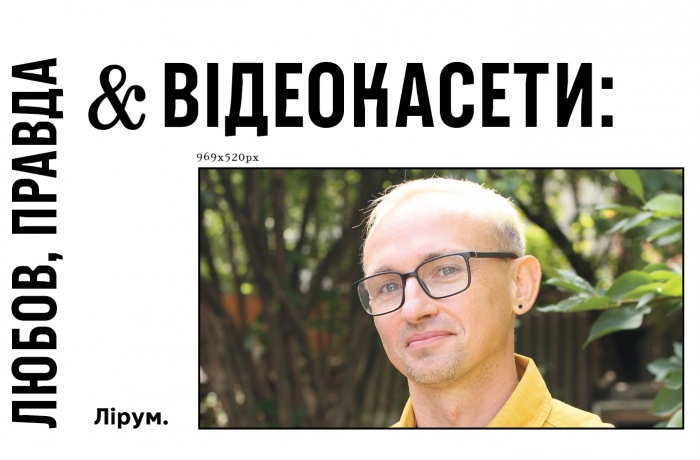
It’s nice to share the fact that there are entire communities of partner organisations in some corners of the Travelling Festivals that demonstrate human rights documentaries in the regions. In Prykarpattya, the festival is created by NGO Young Prosvita and NGO Stan.
Our interlocutor in this conversation is Andriy Volyk, a young regional coordinator, journalist and public activist. He shared his experience with us back in autumn, and right now, in late December, we are receiving daily news from Prykarpattya about bright and warm events both in Ivano-Frankivsk and in Kolomyia, Vorokhta, Kosiv, Sadzhava, Svarychiv, Dolyna, Kalush, Rohatyn, Burshtyn, and Nadvirna. Moreover, we will see a series of additional events until the end of the year.
In this interview, you can read about a person with unlimited energy who believes that now is the time to create dialogue in society and take care about our future already today.
Is it easy to organise the festival in Prykarpattya?
When I think about my memories of the Travelling festival, I immediately recall the challenges we faced as organisers. In 2018, we were supposed to have a closed screening in Ivano-Frankivsk, the film was about the LGBTQ+ community, and we did not openly publicise the location and time of the meeting for safety reasons. But interestingly, the information somehow leaked anyway and we started receiving threats. We were warned that right-wing radical organisations who are very aggressive against the LGBT+ community will come to the event, and we received threats telling us to wait and prepare for it. I was first told about this by some journalists I knew, whom I randomly met at the supermarket. At that time I answered, “Let them come, we’ll talk.”
We did not cancel the film about LGBT+ rights, and none of the provocateurs ever came. It was the first event when I experienced threats. At other events, in 2021, we did meet our opponents. We were doing an advocacy campaign against hate speech in Prykarpattya. Our organisation is known as a human rights organisation, but not everyone is aware what it means; we received threats that “they would come for us.” We organised screenings and discussions in Dolyna, then in Kolomyia, and there we were visited by members of the local far-right community. They watched the film and engaged in the discussion, they tried to provoke a conflict, our discussion was heated, I’d say it was “at peak.”
This was a few years ago, but today, I feel like during the full-scale invasion the viewers of the Travelling Festival are gradually realising that human rights are not a “threat” to some specific groups of people. On the contrary, it’s a value which should be the common ground for all of us, LGBT+, right-wing radicals, and everyone else with various views. This is the only way for Ukraine to become a rights-based state and for us to have our rights protected. We should be partners rather than antagonists to one another. So I am open to dialogue and I believe that changes will happen. We are all working for the common goal, for the good of Ukraine.
Please share your personal story of how your friendship with the Travelling Festival began? In what year, region of Ukraine, maybe in some memorable place?
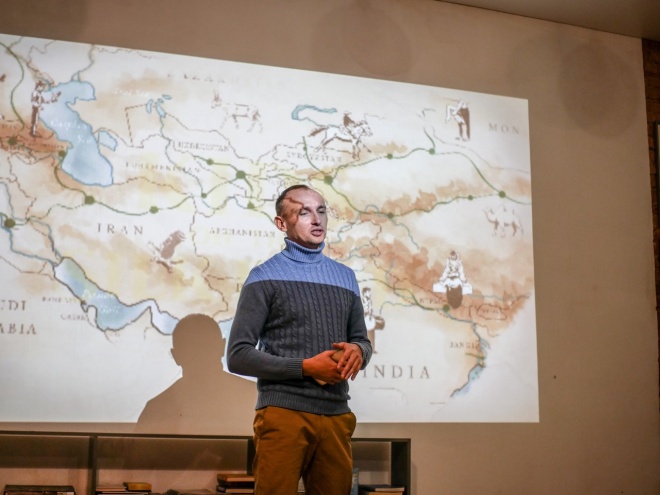
A photo from the archive of the Travelling Docudays UA in Prykarpattya
I was introduced to the festival in 2017. Back then I only just began working in the public sector. Our organisation, NGO Stan, was a festival partner. I was helping my colleague with the media coverage of the Travelling Festival, we wrote about the festival, helped organise events. That was when I realised for the first time that documentaries are not at all like how I imagined them as a kid, that is, boring films which make you fall asleep. In fact, it turned out that documentaries are fascinating.
These films encourage you to rethink seemingly obvious things. They develop dialogue, spark discussions, activate and provoke change.
I know that our organisation has been working with the festival for a very long time, it began back in Luhansk. Back then we were a protest literature group of non-conformists, and in 2014 we relocated to Ivano-Frankivsk and grew into an NGO which unites human rights advocates and cultural figures all over Ukraine.
Please tell us what your organisation is working on these days.
In NGO Stan, I’m responsible for the media, it’s one of the areas we work in. I’m also the coordinator of the Travelling Festival in the region and the moderator of a Docudays UA film club which is part of the DOCU/CLUB Network. I’m very partial to the subject of opposing hate speech. We are surrounded by intolerant aggressive stereotypes, which provokes conflicts. We organise dialogue events and try to use various projects to make people “sit at one discussion table,” make opposing groups of people talk to one another. To make communities communicate, make decisions openly and in a coordinated manner. We have invited the police to our screenings as audience members, that is, we took into account the opinions of both those whose rights need to be protected and those who are supposed to protect their rights.
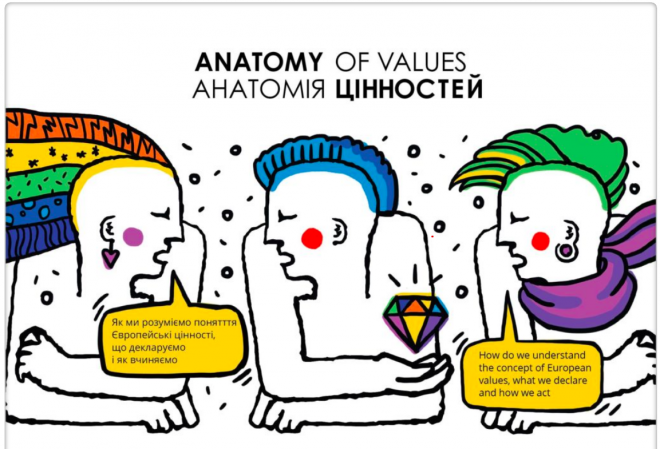
Draft of the Anatomy of Values, a publication by NGO Stan
Before the full-scale invasion, we were more engaged in informal education. We helped organisations or activists who were taking their first steps in the public sector, trained them in various fields of culture, human rights, taught them social entrepreneurship. Now we also have a humanitarian branch, we provide psycho-social support and manage shelters. NGO Stan is trusted, we’ve managed to find support abroad, resources, and our team has really expanded.
We never expected that we’d have to work on “crisis measures.” To help our fellow citizens who have lost their homes due to full-scale invasion find a place to live and food to eat, to provide them not just with basic necessities but comfortable and dignified conditions. I think that many organisations that used to work in just one area have now transformed for our common goal: resist the enemy and help Ukrainians. We’re not just active in Ivano-Frankivsk Region, but also in Zakarpattia, and since we had contacts of regional partners, we’ve been able to help people in Chernivtsi Region, Zhytomyr Region in Berdychiv, in Volyn in Volodymyr. In Zaporizhia, we organised food support for people. I think that even though it’s unexpected, the changes in our work and our organisation are valuable and needed by people, and our work continues.
Has the Travelling Festival in particular affected the decisions you’ve made in your main line of work, or maybe in your personal life?
When I started working with the subject of human rights at the Travelling Festival, I wanted to improve my knowledge in this field. Like, we say “human rights,” what is that? How can a specific person defend them? How to feel, realise that they’re being violated? We’re used to certain human rights violations and, unfortunately, no longer see it as a problem. We think that it’s our “traditions,” “culture,” and there’s “nothing special” about it. Or we feel that something is wrong but we don’t know what to do, we think that one person cannot affect it. Knowledge, learning in-depth about human rights helps you get rid of these biases.
For me, a personal achievement is completing my studies at the Chernihiv Human Rights House. I can’t call myself a human rights advocate yet, I’m a public activist, but I’m taking steps in this direction, I’m taking training courses to understand human rights at a deeper level. The Festival just helped me realise that it’s a major value for me.
In your opinion, what makes the Travelling Festival unique?
Documentaries are presented here in an entirely different format. They’re unique, selected high-quality films which we can only see at the festival. We demonstrate films in the regions free of charge, so it’s accessible to everyone. You can watch a truly global-scale film, meet people who resonate with you in a similar direction, find partners for professional activities. Or, on the contrary, have a discussion with someone who has the opposite opinion. I think the Travelling Festival is a platform which can encourage the first change in the minds of people when they watch a film, discuss it, and then, if they still have energy to finish the work, they arrange to continue doing something together for society. The festival provides an impulse for this, encourages you to be active. Docudays UA films are not always pleasant, but they often play an important role by helping us see and realise our social problems.
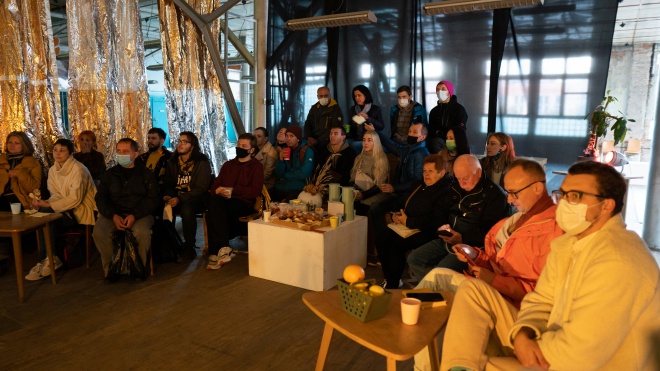
A photo from the archive of the Travelling Docudays UA in Prykarpattya
Last year, we showed the film Cry My River. It brings up the issue of our treatment of nature, our attitude to the place where we’re all going to live. Today we invest all our efforts in defending our country and defeating the enemy, but we should already think about how to build a new country. Before that film, I didn’t think in depth about the scale of the environmental problem. Someone could say, “Well, they’re polluting the river with waste somewhere, let them do it, it’s not here.” This film shows the glaring consequences of this attitude for Ukraine, it affects almost all the regions, it’s not somewhere far away, but also here in Prykarpattya. By the way, it was a discovery for me, because we’re used to thinking that the water in mountain rivers is clean. But the film revealed a completely unexpected truth, which means that it encourages this discussion and encourages us to change, first of all at the level of our worldview and attitudes towards “your river.”
I believe that the Travelling Docudays UA is a big community. By the way, the full-scale invasion has shown that we are not just festival colleagues but also friends who are always ready to support and help one another. From the very first day, we shared news about each and every one of us in our work chats: who had managed to leave dangerous cities, who needed shelter, who joined the army to defend our country. It’s very important. I’ve found friends with whom we’ve kept in touch for many years not only for work, although in professional terms I’ve also found reliable and warm partnerships here.
Please share what film left the biggest impression on you in these years.
It was Jamala’s Struggle. Through a very personal story of a music performer, the film shows the tragedy of Crimean Tatars. You should see it with your own eyes and feel it, and this, for me, is also about dialogue and empathy, about getting rid of prejudice.
What period was the hardest for you during your work on the festival and why?
My first years with the Travelling Festival were difficult, because back then it was hard to find an audience. Most people, just like me, used to believe that documentaries are boring. We have such great films, but how do we make people come to see them? How to communicate the value of these films? And you do so much during the organisation of the festival, and you want to have as many people see them as possible. At first we weren’t always successful. But then I realised that probably people who need to see this do come. It’s not about full houses, it’s about the fact that people who actually realise the value of these films come. People who are prepared to discuss and to act afterwards.
Of course, I want the festival to continue, to develop and grow its audience. But it was a bit hard during the first years. Because I thought that if it’s so interesting to me, it’s just as interesting to everyone, that everyone loves documentaries as strongly as I do. When I came to the festival in Kyiv for the first time and saw the numbers of people who come to watch documentaries, the long lines for the ticket desk, I was impressed. In the regions, we show films free of charge and can’t, for instance, attract so many guests. Then I started thinking, why is that so? And I realised that our work is to help people from my home region to learn more about these incredible, deep and truthful films, to communicate the festival’s values all over Ukraine.
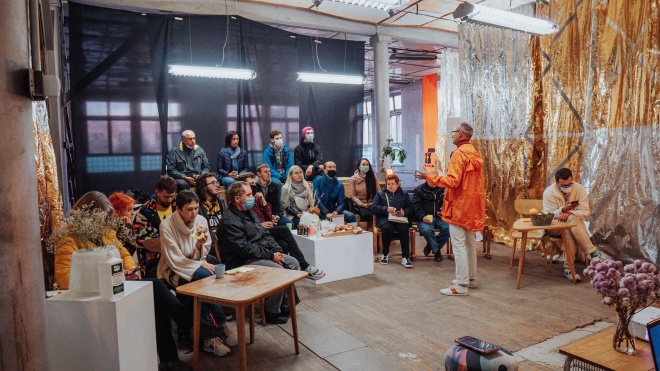
A photo from the archive of the Travelling Docudays UA in Prykarpattya
There can’t be any quick changes here, people’s consciousness is formed over years. As a rule, you can’t just show one film or hold one event and expect everything to change immediately, in a moment, I mean, this work really requires persistence. The festival’s impact can’t be measured, it’s not a commodity to be bought and sold. We, the organisers, must continue to work tirelessly, because it is what we truly believe in.
I want to ask you about the Travelling Festival during the pandemic, was there interest in the audience despite the lockdown and the online format?
We followed all the safety rules, conducted both offline and online screenings. Interestingly, that year we had one of my organisation’s most successful events.
It’s hard for me to tell what exactly was the secret of that year’s success. We focused a lot of attention on smaller communities, where events such as the festival are rare. People there are not “spoiled” by events. For example, if we take Frankivsk, there are many events here every weekend. That year we decided to go to communities, and it was the right decision. Since then, we’ve been doing it every year: we show some films in Frankivsk, because we also have wonderful and keen viewers here, but we also have partners in smaller communities and we try to visit them because we realise that for people in small towns and villages it’s a unique opportunity to see these films.
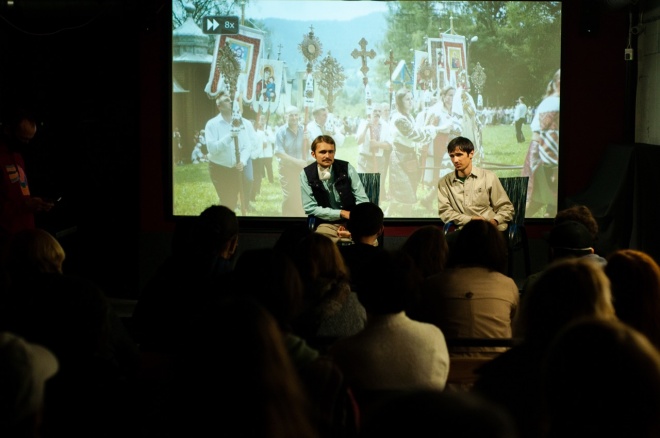
A photo from the archive of the Travelling Docudays UA in Prykarpattya, filmmakers Roman Khimey and Yarema Malashchuk at a screening of Zarvanytsia
How did 2022 change you and why, despite the difficult situation in the country, human tragedies and uncertainty, you continued to work on the festival?
I had no doubt that we’d continue the festival despite everything. We felt that people needed it, we showed films about Azov fighters Orest. Fortress Mariupol for the community who were forced to leave their home city, Mariupol. They recognised the streets, they shared their feelings after the screening. When we all talked together, we realised even more strongly how much this story affects all Ukrainians, it is not abstract, not fabricated somewhere for TV and the news, it is the pain and struggle which we continue to live through every day.
Last year we also saw the film called Tales of a Toy Horse, and it brought us closer to people from other countries. I think it was important to see that we are not alone in this war and the whole world is helping us. It inspires us to work, fight, and never give up.
The festival team was very supportive and gave us creative freedom just so that the Travelling Festival in the regions could happen and people could feel the unity and think about true stories that surround us in a circle of like-minded people.
In the six years of working on the festival, maybe based on your observations, how has the audience changed, how have they been affected by documentary cinema?
We have regular viewers, and it’s nice that I see the same people every year. We’ve already formed a small community which waits for the festival every year. We continue looking for new approaches to the Travelling Festival in our region, we try to be closer to people. For example, we make a point not to show films in cinemas, instead we engage NGOs, culture and art centres. This creates an atmosphere of trust at screenings, we talk to each other frankly and discuss.
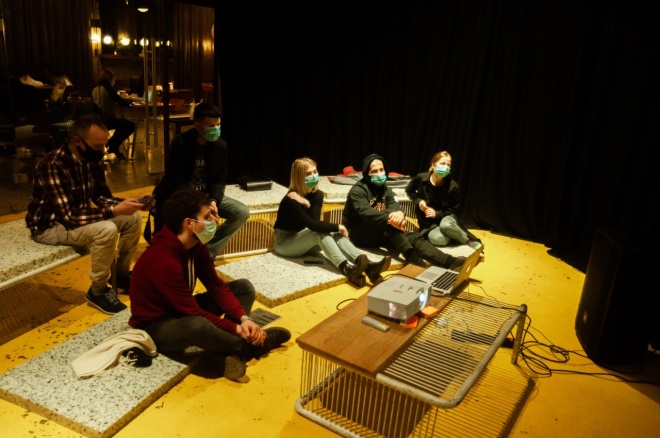
A photo from the archive of the Travelling Docudays UA in Prykarpattya
Over the years, the festival is gaining popularity, it’s getting easier to arrange events, because people already know and value us. I remember that in the first years we were something new, unknown and obscure for our audience, they were doubtful about our suggestions, we had to explain what human rights documentaries were, and now people ask a year in advance when the festival is going to be and when we’re going to visit their communities with events. For example, I’m very happy that in Kolomyia, our screenings always attract a full house.
How do you see the image of the Travelling Festival’s future?
Since 2019, NGO Stan has been working with veteran organisations and initiatives that help the soldiers who return from the frontline. In this time, we’ve implemented many projects related to the reintegration of veterans, strengthening their role in the community, or helping their physical and mental rehabilitation. In this way, we try to draw the public’s attention to the problems faced by veterans and find a way to solve them. This year, the screening of Second Wind and an art therapy masterclass which we organised for the wounded warriors at the regional hospital was another important step in this direction. Because as long as their rehabilitation after serious injuries continues, it is very important to provide moral and psychological support, so that they can continue to feel that they are a necessary part of the community. I hope that we’ll be able to build a stable partnership in this area, and that we will have these events regularly.
I also imagine how we could show films and have discussions in every community in Prykarpattya. In the few weeks of the Travelling Festival in our region, we visit up to six towns and villages on average, but my dream is for our capacity to increase over time and for us to have screenings everywhere at once, because every community is important. We also work actively to increase the number of film clubs. For example, in summer we initiated a new DOCU/CLUB branch in Rohatyn.
And finally, my cherished dream is about modern Ukrainian film schools for documentary filmmakers. I always want to see more Ukrainian experience on the screen and talk about it, these films already exist, but there’s never enough of them. It’s useful both for social change and for the filmmaking industry. I want a situation where it’s not others who bring films to us, but it’s we who take them all over the world to share the stories of our incredible people.
The conversation has been recorded by Ksenia Opria.
The 20th Travelling Docudays UA is held with the support of the Embassy of Sweden in Ukraine, Embassy of Switzerland in Ukraine, US Embassy in Ukraine. The opinions, conclusions or recommendations do not necessarily reflect the views of the governments, charities, or companies of these countries. Responsibility for the contents of the material lies solely on its authors.












